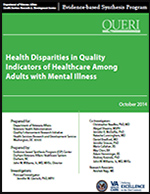
Principal Investigators:
Jennifer M. Gierisch, PhD, MPH
Co-Investigators: Christopher Beadles, PhD, MD;
Abigail Shapiro, MSPH;
Jennifer R. McDuffie, PhD;
Natasha Cunningham, MD;
Daniel Bradford, MD;
Jennifer Strauss, PhD;
Marie Callahan, BS;
May Chen, BA;
Adam Hemminger, BS;
Andrzej Kosinski, PhD;
John W. Williams, Jr., MD, MHSc
Download PDF: Complete Report, Executive Summary, Report, Appendices
The burden of mental illness among Veterans is substantial, and medical illnesses such as diabetes and cardiovascular disease affect a disproportionate number of people with mental illness. For example, more than 90% of people with serious mental illness (SMI) (eg, schizophrenia, bipolar disorder) have co-occurring chronic medical conditions such as hypertension, cardiovascular disease, hyperlipidemia, or diabetes. These chronic medical conditions, when co-occurring with mental illness, are more detrimental to overall health than in the general population, and people with comorbid mental illness and chronic medical conditions have higher hospitalization rates and healthcare costs than those with comparable chronic medical conditions alone. Disparities in health between people with and without mental illness are likely due to a combination of factors such as the effect of mental illness on an individual's capacity to maintain health, the adverse effects of medications used to treat mental illness, individual-level modifiable risk factors (eg, smoking, physical inactivity), and lower quality of healthcare.
Healthcare systems are complex organizations, and assessing quality within these organizations is challenging. One approach to evaluating quality of care within healthcare systems is the use of tracer conditions as quality indicators. This approach focuses on targeted prevalent conditions for which strong evidence and agreement concerning appropriate processes of care (eg, annual foot exams for patients with diabetes) and goals of therapy (eg, blood pressure < 140/90) exist; making it possible to uncover deficits in complex healthcare systems. Chronic medical illnesses such as diabetes, heart disease, and hypertension are highly prevalent among VA patients: an estimated 72% have one or more chronic medical illnesses (compared to 40% to 50% of other U.S. adults), and over half have at least 2 such conditions. Thus, diabetes, hypertension, and ischemic heart disease may serve as ideal tracer conditions to assess quality in the Veterans Affairs (VA) healthcare system as a whole. In similar fashion, receipt of selected recommended preventive screenings and services provides an opportunity to examine system-level quality of care among certain subpopulations.
In order to guide future research and policy decisions for the VA, the VA Office of Heath Equity partnered with the Evidence-based Synthesis Program (ESP) to conduct a systematic review of health disparities in quality indicators of healthcare among adults with mental illness. We evaluated comparative studies that assessed a broad range of preventive care and chronic disease management quality indicators to assess if, and to what extent, disparities in healthcare exist for individuals with mental illness.
Key Question 1: Among adult patients, are there health disparities for those with mental illness compared
to those without mental illness in the following areas:
a. Receipt of appropriate preventive care services and indicated screening (eg, cancer
screening, immunizations)?
b. Management of chronic conditions (eg, quality indicators for diabetes care)?
Key Question 2: For those with mental illness compared to those without mental illness, do any observed health disparities in preventive care, indicated screening, or chronic disease management vary based on race/ethnicity, Veteran status, geographic location, sex, or sexual orientation?
Disparities in Healthcare Quality Indicators Among Adults with Mental Illness (Management eBrief)
Disparities in Healthcare Quality Indicators among Adults with Mental Illness: A Systematic Review (Cyberseminar)
Peterson K, Anderson J, Boundy E, Ferguson L, McCleery E, Waldrip K. Mortality Disparities in Racial/Ethnic Minority Groups in the Veterans Health Administration: An Evidence Review and Map. American Journal of Public Health. 2018;108(3):e1-e11. doi: 10.2105/AJPH.2017.304246